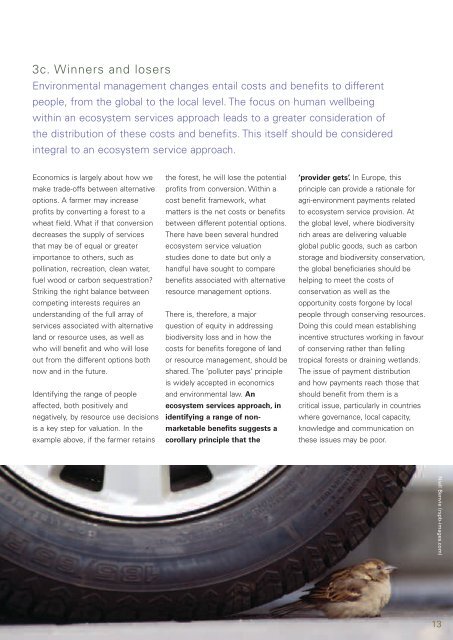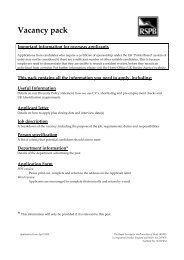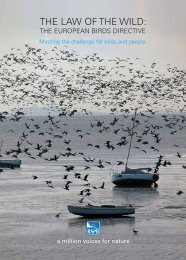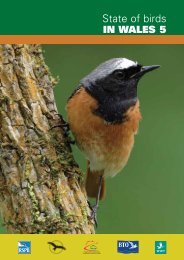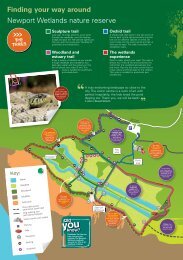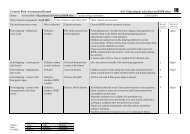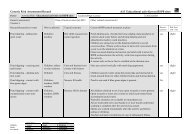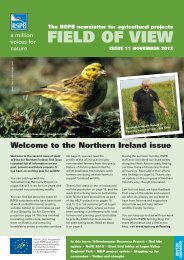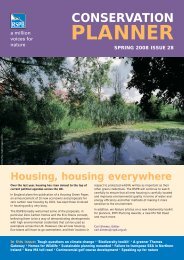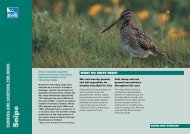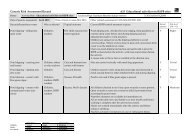Naturally, at your service: - RSPB
Naturally, at your service: - RSPB
Naturally, at your service: - RSPB
Create successful ePaper yourself
Turn your PDF publications into a flip-book with our unique Google optimized e-Paper software.
3c. Winners and losers<br />
Environmental management changes entail costs and benefits to different<br />
people, from the global to the local level. The focus on human wellbeing<br />
within an ecosystem <strong>service</strong>s approach leads to a gre<strong>at</strong>er consider<strong>at</strong>ion of<br />
the distribution of these costs and benefits. This itself should be considered<br />
integral to an ecosystem <strong>service</strong> approach.<br />
Economics is largely about how we<br />
make trade-offs between altern<strong>at</strong>ive<br />
options. A farmer may increase<br />
profits by converting a forest to a<br />
whe<strong>at</strong> field. Wh<strong>at</strong> if th<strong>at</strong> conversion<br />
decreases the supply of <strong>service</strong>s<br />
th<strong>at</strong> may be of equal or gre<strong>at</strong>er<br />
importance to others, such as<br />
pollin<strong>at</strong>ion, recre<strong>at</strong>ion, clean w<strong>at</strong>er,<br />
fuel wood or carbon sequestr<strong>at</strong>ion?<br />
Striking the right balance between<br />
competing interests requires an<br />
understanding of the full array of<br />
<strong>service</strong>s associ<strong>at</strong>ed with altern<strong>at</strong>ive<br />
land or resource uses, as well as<br />
who will benefit and who will lose<br />
out from the different options both<br />
now and in the future.<br />
Identifying the range of people<br />
affected, both positively and<br />
neg<strong>at</strong>ively, by resource use decisions<br />
is a key step for valu<strong>at</strong>ion. In the<br />
example above, if the farmer retains<br />
the forest, he will lose the potential<br />
profits from conversion. Within a<br />
cost benefit framework, wh<strong>at</strong><br />
m<strong>at</strong>ters is the net costs or benefits<br />
between different potential options.<br />
There have been several hundred<br />
ecosystem <strong>service</strong> valu<strong>at</strong>ion<br />
studies done to d<strong>at</strong>e but only a<br />
handful have sought to compare<br />
benefits associ<strong>at</strong>ed with altern<strong>at</strong>ive<br />
resource management options.<br />
There is, therefore, a major<br />
question of equity in addressing<br />
biodiversity loss and in how the<br />
costs for benefits foregone of land<br />
or resource management, should be<br />
shared. The ‘polluter pays’ principle<br />
is widely accepted in economics<br />
and environmental law. An<br />
ecosystem <strong>service</strong>s approach, in<br />
identifying a range of nonmarketable<br />
benefits suggests a<br />
corollary principle th<strong>at</strong> the<br />
‘provider gets’. In Europe, this<br />
principle can provide a r<strong>at</strong>ionale for<br />
agri-environment payments rel<strong>at</strong>ed<br />
to ecosystem <strong>service</strong> provision. At<br />
the global level, where biodiversity<br />
rich areas are delivering valuable<br />
global public goods, such as carbon<br />
storage and biodiversity conserv<strong>at</strong>ion,<br />
the global beneficiaries should be<br />
helping to meet the costs of<br />
conserv<strong>at</strong>ion as well as the<br />
opportunity costs forgone by local<br />
people through conserving resources.<br />
Doing this could mean establishing<br />
incentive structures working in favour<br />
of conserving r<strong>at</strong>her than felling<br />
tropical forests or draining wetlands.<br />
The issue of payment distribution<br />
and how payments reach those th<strong>at</strong><br />
should benefit from them is a<br />
critical issue, particularly in countries<br />
where governance, local capacity,<br />
knowledge and communic<strong>at</strong>ion on<br />
these issues may be poor.<br />
Niall Benvie (rspb-images.com)<br />
13


